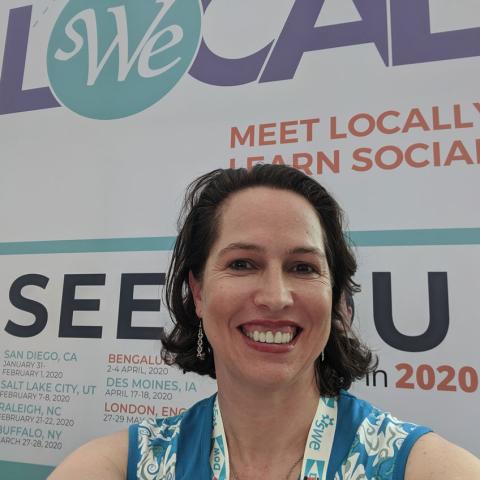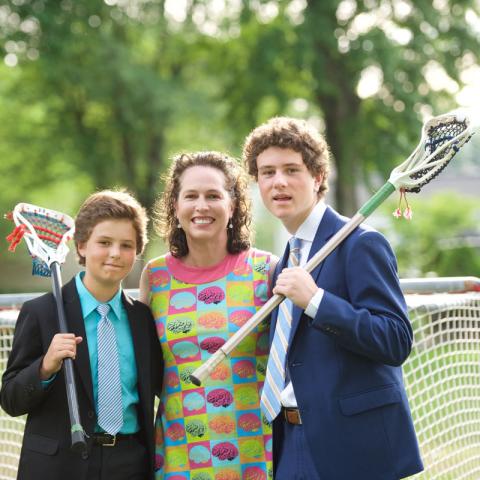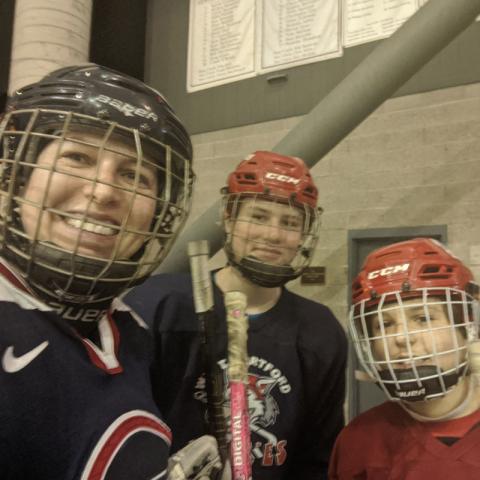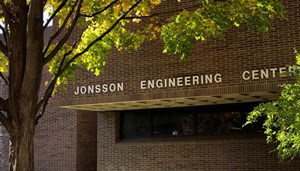
On Problem Solving, Making the World Better, and Supporting Diversity and Women in Engineering
Tell us a bit about yourself.
I grew up on Long Island (NY) and attended Lawrence High School – a relatively small school where everyone knew everyone. I had a few different ‘groups’ of friends, some that I had known since before elementary school. Most of my close friends went to college, many to Ivy League. I played on the softball team (we weren’t very good!) and was active in several clubs.
What led you to pursue an engineering degree, and to RPI?
Originally I was planning to be an architect, after my uncle who was one. I took a summer program in architecture at Cornell and after a few weeks, realized that I didn’t have the mindset for it. It was suggested by someone (I wish I could remember who!) that I consider engineering instead, since I was more worried about the structure and practicality of the buildings than I was about the aesthetics. Once I made the decision to major in engineering, there was a short list of schools that I was considering and RPI was one. After a campus visit, I was convinced I would be happiest there.
What was your Rensselaer experience like in general and as a female student at RPI?
I very much enjoyed my experience at Rensselaer and took advantage of being the ‘minority’ (all those fraternity parties didn’t hurt either)! I found a great group of women to hang out with and they became my support system. I have extremely fond memories of the women in the Society of Women Engineers (SWE) section that welcomed me and helped me grow as a leader. The only time being a female at RPI was an issue was in a class where the professor thought he was being ‘nice’ by putting all the women together in a group…unfortunately we were all IE’s so it wasn’t the best idea when working the problems that required a diverse skill set.
Is there a specific memory from your RPI days that you wish to share?
The best part of each year for me was coordinating the SWE weekend, where we invited accepted female students to campus to spend a few nights. Recruiting volunteers, organizing events, and making sure we followed all the rules was a lesson in resilience, patience, and follow thru. Leaving a well-documented process for the following years was part of my legacy. On a lighter note, I enjoyed my once-a-week updating of the Union schedule white board, a ‘job’ I inherited from an upperclass friend from BARH. It was a great way to keep up with campus events and meet people who always wondered who actually made the updates!
You have two degrees from Rensselaer. How did a Rensselaer education prepare you for success?
The Rensselaer degree means we have developed strong problem-solving skills, a drive to make the world better, and (especially for women) a powerful sense of self-confidence. Starting with a strong knowledge base, we were able to add on real-world situations, work in teams, and be prepared for working in industry. Where my undergraduate degree gave me the skills to be a successful engineer, the graduate MBA gave me the real industry examples and the tools to make sound business decisions.
You are a successful engineer, manager, and a leader. What were some of the challenges you faced in this trajectory, and how did you overcome them? What did you enjoy the most along this journey?
Some of my biggest challenges were early in my career, having to prove myself in the manufacturing industry, which is an area I never thought I’d end up in. I was behind some of my colleagues who knew more about manufacturing than I did, so I had to listen and learn a lot quickly. I learned who the influencers in the shop were, how to solicit their feedback, and provide real solutions to their problems. From then on, they were advocates for me, making sure others would help when asked. Since then, I’ve always remembered to treat everyone equally, that everyone’s knowledge is important, and to listen before taking action. I’ve enjoyed most the people I’ve met over the years and the variety of knowledge I’ve gained from them. When the occasion comes to cross-paths again, it’s great to reminisce about previous experiences and build a stronger working relationship from there, rather than starting over.
We know that you are a strong champion for women in engineering. Rensselaer Engineering is working hard to recruit more women students as well as women faculty, with good success. Why is it important to recruit more women to STEM careers?

It is so important to recruit more women into STEM careers because innovation comes from everywhere. Diverse ideas are imperative to moving forward to solve so many problems. We cannot just rely on less than half the population to provide the STEM skills of the future. And we can’t rely on a homogeneous viewpoint to represent the whole world. A diverse workforce results in better solutions for a wider variety of users and makes companies more money.
Tell us about your work and leadership at the Society of Women Engineers (SWE).
I am honored to have served as the FY’18 president of SWE, capping a 25+ year leadership journey with the organization. It all started at RPI in the campus SWE section in the early 1990s. After graduation, I used the SWE network in my new state of Connecticut to connect with other professionals and get information about the area, the industry, and events. I served as the Hartford section secretary for 10 years before branching out into regional leadership in SWE. I served as chair of several Society committees and regional conferences as well as being part of the inaugural Senate before being elected to the Board of Directors.
While in leadership, I led/co-led several initiatives including the Globalization Advisory Board, the Employer Sponsored Membership program, development of a new Society Strategic Plan and the Ethics committee process. During my term as president, we sunset the region governance model which angered many members but was the right thing to do for Society growth and evolution. It was a lesson in change management, and I am forever grateful for the team of folks who helped behind the scenes and in the sections to make the transition easier.
The world is changing rapidly. How have things evolved in your discipline? What do you see as exciting opportunities for engineers in the future?
I haven’t actually worked as an Industrial Engineer in a long time, but I see changes in general for engineers around technology and communications. Working globally wasn’t on our minds when I was in school, now it’s practically a requirement. And of course, the rise of the internet, online communications, and software tools that we once thought were cutting edge are now commonplace. Adapting from actual blueprints and paper operation sheets to electronic drawings and instructions was a learning curve that today’s students probably take for granted. But that opens up a world of possibilities for today’s students who can work anywhere with anyone. Cultural adaptability and flexibility in working with others around the globe is a fundamental skill now.
What do you do for fun?

We are a hockey family….all of us play and in the winter we put up a backyard rink. In the summer, we like to hike and bike and we’re very competitive in miniature golf. And we always must check out the best ice cream places in the area! Also, with 2 teenage sons, we have to be very creative to come up with new recipes to keep them full. When travel opens up again, we hope to reschedule our trip to Barcelona that we had planned back in August. My kids have been to more countries already than I had by the time I graduated from college.
What is your message to current Rensselaer students?
You are all in a unique situation right now so take advantage of it. You may be missing some of the on-campus part of your experience, but you can use the time to do so many other things that will make you a more valuable in the future. It is ultimately the strong, meaningful network you develop that matters, not the actual campus activities.
